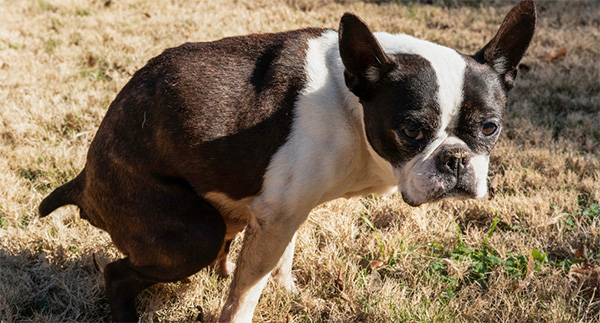When it comes to the health of our beloved canine companions, every symptom matters - even those that might seem trivial at first glance. One condition deserving attention is canine constipation, a frequently encountered problem that is sometimes underestimated. While usually not serious, this condition can be uncomfortable for your pet and indicative of underlying health concerns.
Recognizing your dog's typical bowel habits is essential for identifying signs of constipation. A deviation from these habits, such as difficulty in passing stool or an unusual decrease in its frequency, can be the first sign of constipation. Beyond mere discomfort, extended constipation can escalate into more severe health issues. Therefore, it's essential to recognize the signs early and understand the possible causes, ranging from dietary issues to more serious health problems.
In this guide, we will explore the nuances of dog constipation: what causes it, how to recognize it, and, importantly, how to address it.
What is Dog Constipation
Most dogs typically experience at least one bowel movement daily, often aligning with their feeding schedule. In cases of constipation, a dog may repeatedly try but fail to defecate. Dog constipation is a common yet concerning issue for pet owners when a dog has difficulty passing stool or does so less frequently than normal. This condition, often marked by hard, dry stools, can cause discomfort and strain during bowel movements. While typically not a severe health threat, it can indicate dietary imbalances, dehydration, or underlying medical issues. Persistent or chronic constipation may indicate an underlying and potentially more serious health issue.
Symptoms Of Dog Constipation
Dog constipation symptoms are important for pet owners to recognize to ensure timely and appropriate care. Common signs include:
Infrequent Bowel Movement
Straining to Defecate
Hard, Dry Stools
Pain or Discomfort
Lack of Appetite
Lethargy
Bloody or Mucus-Coated Stool
Vomiting
Abdominal Discomfort or Bloating
Changes in Behavior
If your dog exhibits any of these symptoms, it's important to consult with a veterinarian. Constipation can occasionally serve as a symptom of a more profound underlying health issue that requires attention and resolution.

Cause Of Constipation In Dogs
Dog constipation can stem from various factors, spanning from dietary concerns to medical conditions. Grasping these causative elements is essential for both prevention and effective treatment. Here are some common causes of constipation in dogs:
Dietary Factors
Lack of Exercise
Age-Related Issues: Older dogs are more prone to constipation due to decreased physical activity and slower metabolic processes.
Obstructions
Medications
Anal Gland Problems
Neurological Disorders
Dehydration
Environmental Stress: Changes in the environment, routine, or stress can disrupt a dog's regular bowel habits.
Underlying Medical Conditions
Rectal or Anal Problems
Understanding your dog's specific cause of constipation is important for determining the appropriate treatment. If your dog is suffering from constipation, especially if it's recurrent or severe, consulting a veterinarian is essential for a proper diagnosis and treatment plan.
How is Dog Constipation Diagnosed
Diagnosing dog constipation typically involves a comprehensive approach, as it's important to determine the presence of constipation and its underlying cause. Here's how veterinarians generally diagnose constipation in dogs:
Clinical History and Physical Examination Of Dog's Abdomen
Digital Rectal Examination
Blood Tests
Abdominal X-rays
Ultrasound
Endoscopy
Fecal Examination
Neurological Examination
The specific diagnostic tools will depend on the dog's symptoms, age, overall health, and medical history. Once a diagnosis is made, the vet will recommend an appropriate treatment plan, including dietary changes, medication, or surgery in severe cases.
How to Treat Constipation in Dog
Treating constipation effectively involves both immediate relief of the current episode and addressing any underlying causes to prevent future occurrences. Here's a comprehensive approach to dog's constipation:
Dietary Adjustments
Dietary adjustments play a crucial role in managing and preventing constipation in dogs. The primary objective is to guarantee that the diet fosters healthy digestion and consistent bowel movements. An essential component to consider is the fiber content. Fiber supports digestion by increasing stool bulk and encouraging regular bowel movements.
Stool Softeners or Laxatives
Vets may prescribe dog-specific stool softeners or laxatives to ease bowel movements. It's vital to avoid human medications unless specifically advised by a vet, as some can be toxic to dogs.
Increased Exercise
Regular physical activity helps stimulate the intestines and promote normal bowel movements. Increasing walks, playtime, and other forms of exercise can effectively manage constipation.
Enemas
A vet-administered enema can help soften and expel hard stool in more severe cases. A professional should only perform this procedure, as improper administration can cause injury or worsen the condition.
Manual Removal of Stool
A veterinarian may need to physically remove stool from the rectum or dog's digestive tract for severe impactions. Typically, this procedure is conducted under sedation or anesthesia to reduce discomfort and stress for the dog.
Change in Routine
Reducing stress by maintaining a consistent daily routine can help some dogs. Changes in the environment, schedule, or household can be stressful for pets and impact their bowel habits.
Ensuring Adequate Hydration
Hydration is vital in preventing constipation. Some dogs may require encouragement to increase their water intake. You can try placing multiple water bowls around the house or even flavoring the water with a bit of chicken broth (make sure it's onion- and garlic-free). Wetting dry food is another strategy to increase water intake.

Dog Constipation Home Remedies
Canned Pumpkin
For instance, adding canned pumpkin to your dog's meals is an excellent way to increase fiber intake. Pumpkin is high in fiber and helps hydrate the dog's stool, making it easier to pass. Utilizing pure canned pumpkins is crucial, as is avoiding pumpkin pie filling that contains sugars and spices that are unsuitable for dogs. Alternatively, wheat bran can be mixed into your dog's regular food. Introduce these high-fiber additions gradually and in small quantities to prevent upsetting your dog's stomach.
Canned Food
Transitioning to canned dog food can prove beneficial for dogs experiencing constipation. It is advisable to avoid dry food, as it may not be optimal for your dog's digestive health. Canned food generally has a higher moisture content than dry kibble, aiding in stool softening. Moreover, many canned dog foods are specially formulated to support a dog's digestive system, often containing a balanced mix of fibers and other nutrients essential for maintaining a healthy digestive system.
Probiotics
Enhancing the dog's diet with probiotics can contribute to maintaining a healthy balance of gut bacteria, promoting digestion and regular bowel movements. Probiotics alleviate constipation symptoms by enhancing gut motility and facilitating smoother stool passage. They also assist in absorbing nutrients more efficiently, contributing to overall digestive health. Regular intake of probiotics can thus maintain a healthy gastrointestinal environment, preventing constipation and improving a dog's digestive comfort and well-being.
Apple Cider Vinegar
Apple cider vinegar, a popular natural remedy, can benefit dogs with constipation. Its acidic properties help stimulate digestive juices, improving bowel motility and aiding in regular bowel movements. When appropriately diluted and administered in small quantities, it can assist in softening stools, facilitating easier passage. Additionally, apple cider vinegar promotes a healthy balance in the gut flora, contributing to overall digestive health. Nonetheless, it is crucial to consult with a veterinarian before incorporating it into your dog's diet to guarantee safety and determine the appropriate dosage.
Olive Oil
Olive oil is a mild and effective remedy for alleviating constipation in dogs. Its lubricating properties help ease the passage of stools through the intestines, providing relief from constipation. A small amount added to the dog's food can stimulate bowel movement, making stools softer and easier to pass. Besides aiding digestion, olive oil also contributes to a healthy coat and skin. However, it should be used in moderation and under veterinary guidance, as excessive use can lead to diarrhea and other issues.
High Fiber Fruits And Vegetables
Integrating high-fiber fruits and vegetables into a dog's diet can effectively alleviate constipation. These natural sources of fiber, like pumpkin, sweet potatoes, apples, and green beans, add bulk and moisture to the stool, facilitating smoother bowel movements. The fiber in these foods enhances intestinal motility, aiding in stool's regular and comfortable passage. Introducing these fruits and vegetables gradually is essential to prevent digestive distress. They offer a healthy, nutritious way to maintain regularity and overall digestive health in dogs.
When should I take my constipated dog to the vet?
If your dog is experiencing constipation, monitoring the situation closely and considering veterinary attention under certain circumstances is essential. You should take your dog to the vet if your dog has been constipated for a few days, cannot produce normal stool, or shows discomfort while trying to defecate.
Immediate veterinary care is also necessary if your dog displays signs of pain or distress, such as whining or crying during defecation, or if they begin to vomit, especially in conjunction with attempts to pass stool. Blood in the stool or extremely hard, dry stools are also alarming signs requiring prompt, professional assessment.
Additionally, changes in your dog's behavior, like increased lethargy or a lack of appetite, can be associated with severe constipation and warrant a vet visit. Dogs with visibly swollen or hard abdomens, particularly if they show discomfort when touching their belly, must be examined by a vet. This holds particularly true for dogs with a history of digestive or anal gland issues.
Finally, if you have tried mild home remedies, such as dietary changes, without success within a day or two, it's advisable to seek veterinary advice. Delaying veterinary care in cases of severe or persistent constipation can lead to more serious health complications, so timely intervention is crucial for your dog's well-being.
